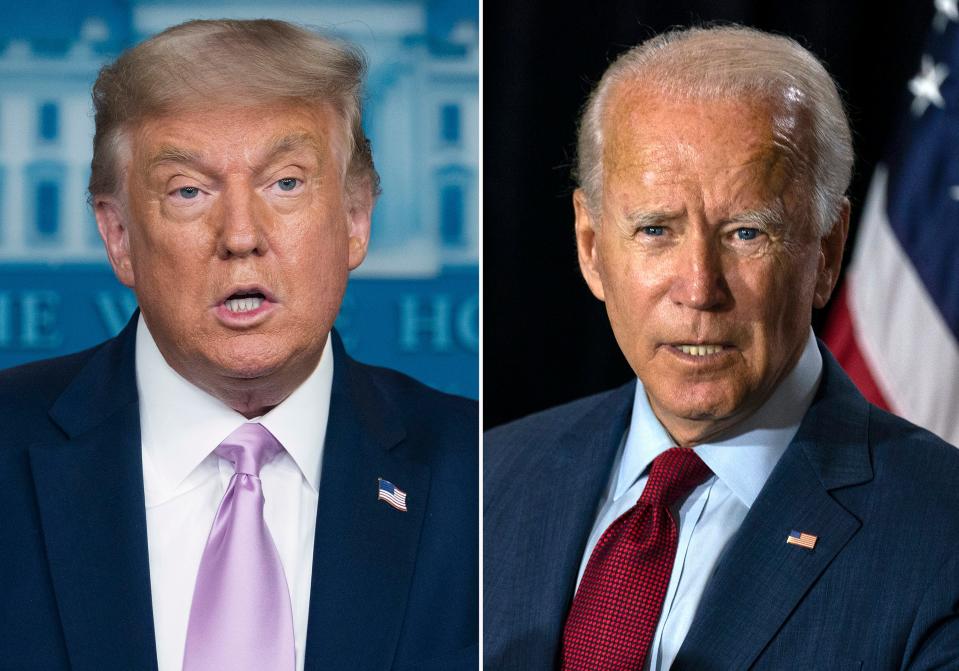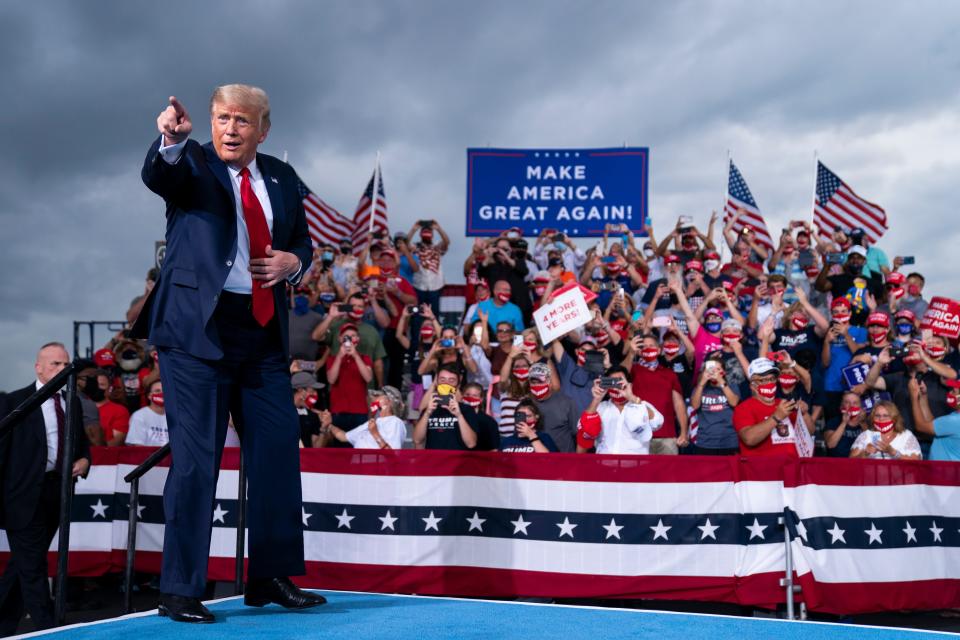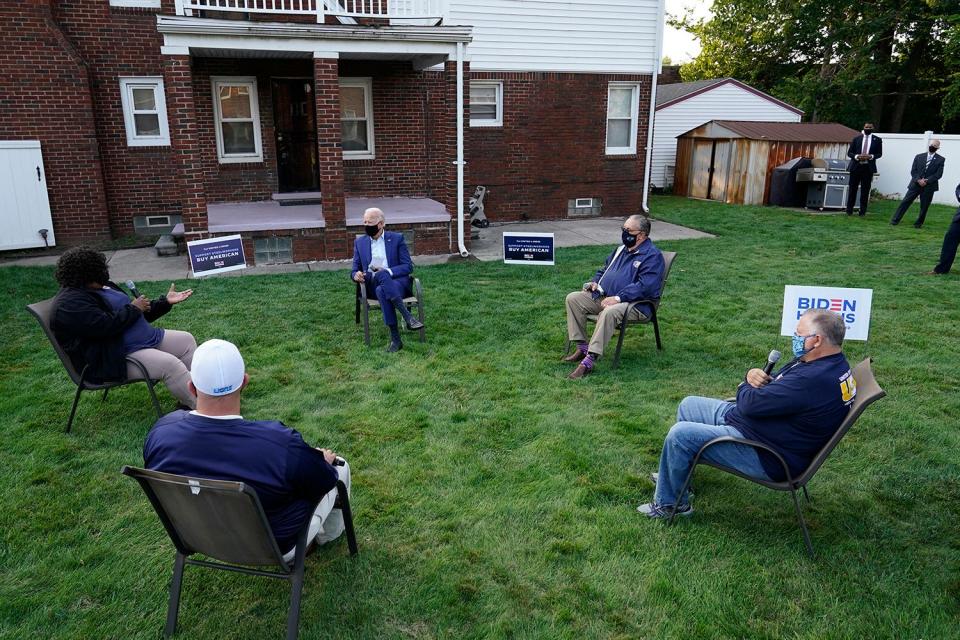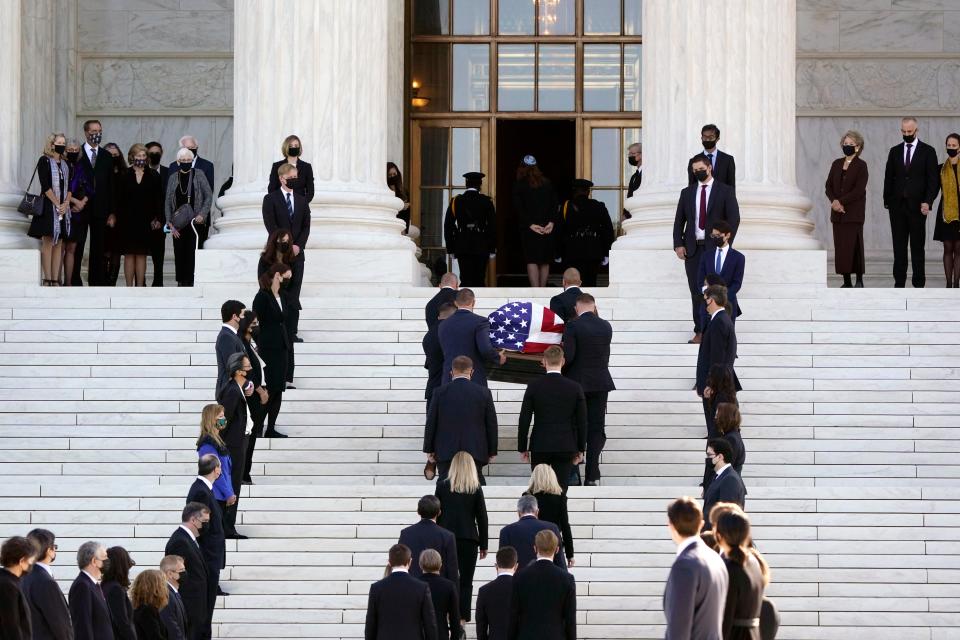Trump's campaign has a massive door-knocking operation. Biden's is just getting started. Will it matter?
WASHINGTON – Every week since August, President Donald Trump's campaign says, volunteers knock on more than 1 million doors around the country. With a little more than 30 days before the election, Joe Biden's team launched its door-to-door campaign just this week.
The president's campaign is betting that even during a pandemic, face-to-face voter contact will give Trump an edge. But the Biden camp is making a different calculation.
The candidates' treatment of the coronavirus pandemic – which Trump asserts is "behind us" and Biden warns is getting worse – has shaped how both of their campaigns have been reaching out to voters.
Trump's contraction of COVID-19 and his resulting quarantine has sidelined him from the campaign trail for the immediate future. His campaign has already cancelled a rally planned in Florida Friday and jeopardized four other upcoming rallies – two in Wisconsin Saturday and two in Arizona (one Monday, the other Tuesday).
"Trump is a high-energy president with a giant personality," said Dan Eberhart, an energy company executive and GOP fundraiser. "Without his persona, the campaign is missing its energy source to run its (get-out-the-vote program) and cash machine."
Both are deluging the airwaves and the internet with ads, but they have been vastly at odds when it comes to individual voter contact.

The Trump campaign believes the personal touch gives them an edge to persuade and mobilize voters.
“President Trump and his campaign have always placed incredible value in connecting directly with voters and right now, we’re the only campaign asking people for their vote in person," said Samantha Zager, a spokeswoman for the Trump campaign, said last week prior to Biden's announcement. "... We’re firing on all cylinders with ads, targeted visits to key states, and our massive ground game operation.”
As of Wednesday, the campaign said it has knocked on nearly 17.3 million doors (with a goal of 30 million by the election) and made more than 91 million phone calls. Four years ago, the campaign knocked on more than 21.6 million doors and dialed nearly 11 million homes.
More: Joe Biden endorsed, Trump excoriated by nearly 500 retired top military, national security officials
But Biden's campaign, careful not to undermine the former vice president's message of social distancing during the pandemic, has said it can be just as effective through phone banks, virtual programs and smaller person-to-person efforts that result in fewer but more meaningful contacts with voters.
Even so, as the campaign heads for the homestretch and early voting has already begun in more than two dozen states states, the campaign is expanding face-to-face efforts while still hewing to virus safety guidelines.
More: Here's what Trump's positive COVID-19 test means for the 2020 election campaign
"Our voter contact operation is the most innovative and technologically advanced of any presidential campaign in history; and it has been thriving in this unprecedented environment – especially in terms of the most important metric: meaningful conversations with voters,” Biden campaign manager Jen O'Malley Dillon said in a statement.
“We're now expanding on our strategy in a targeted way that puts the safety of communities first and foremost and helps us mobilize voters who are harder to reach by phone now that we're in the final stretch and now that Americans are fully dialed-in and ready to make their voices heard,” she continued. The Associated Press first reported the new Biden campaign efforts.
Overstating importance of voter outreach?
A massive ground game – one that includes door-knocking, face-to-face events, and heavy community presence – could help mobilize voters to the polls. But it's not expected to do much to sway folks on the fence.
Despite the often massive effort to persuade undecided voters, University of California-Berkeley researchers David Broockman and Joshua Kalla found that voter outreach efforts have practically "zero" effect on winning over voters.
More: FBI warns delayed election results could be exploited by foreign actors spreading disinformation
"The circumstances in which citizens’ political choices appear manipulable appear to be exceedingly rare in the elections that matter most," they wrote in their 2017 analysis.
In addition, there are fewer minds to change than there were four years ago.
Political analysts predict that the number of voters unable to decide until the last minute will be smaller in 2020 than four years ago. In 2016, the historic unpopularity of Trump and Democrat Hillary Clinton had many voters hemming and hawing up to the end. Ultimately, that group swung heavily for Trump.
More: Trump claims during Nevada campaign rally that Democrats are trying to 'rig' upcoming election
In a Monmouth University poll in early September, 81% of registered voters nationally said they had made a choice in the presidential race and were certain about it. Another 11% have picked a candidate but could still change their mind. And 8% were undecided.
Four years ago in late August, that same survey found 66% of likely voters were sure about who they were backing, 16% were leaning toward a candidate but not locked in, and 18% were undecided.
Trump campaign targeting voters in swing states
Through Wednesday, the Trump campaign is reporting it’s already made about 116 million “voter contacts” through phone banks and door knocking efforts – more than three times the number achieved four years ago during the entire campaign.

Key battleground states have seen a flurry of voter outreach, according to the campaign, including:
Arizona: 5.6 million voter contacts.
Florida: 17.2 million voter contacts.
Michigan: 5.5 million voter contacts.
Minnesota: 3.4 million voter contacts.
Nevada: 2.6 million voter contacts.
North Carolina: 7 million voter contacts.
Pennsylvania: 8.7 million voter contacts.
Wisconsin: 10.4 million voter contacts.
In addition, the campaign reports that scores of training sessions and “MAGA Meet-ups” have attracted tens of thousands of participants.
Bu not all voter outreach works, said Rita Kirk, a professor at Southern Methodist University in Dallas who studies political messaging.
“The most effective means of door knocking is neighbor to neighbor. If it’s someone who lives near you, it seems more personal,” she said. “One of the reasons door knocking is effective is that it reminds voters to vote and, if they merely say they intend to vote, they are more likely to actually do it. Getting that verbal commitment can help increase turnout.”
But Kirk said canvassing during a pandemic can backfire.
“If residents have isolated themselves to feel safe, it may be that the intrusion of someone coming to your door may result in a negative reaction,” she said.
Biden's battleground state effort
Amid the pandemic, the Biden campaign has focused on a digital campaign, including hosting video events and reaching out to voters via social media, in addition to doing virtual phone banking and continuing to buy radio and TV ads.
But as Election Day draws near in these final weeks, the Biden campaign is now entering a new phase of in-person canvassing, where there will be face-to-face contact with voters while still following health guidelines in each state.
The Biden campaign expects hundreds of volunteers to participate in these efforts, with them focusing on voter education, like early voting and get out to vote efforts. For example in Pennsylvania, over 6,000 volunteers in the last 36 hours said they would be interested in doing in-person events.
Over the last several weeks, the campaign has also opened more than 100 voter activation centers in lieu of traditional campaign organizing offices in at least 17 battleground states. Volunteers will be able to pick up lawn signs, borrowed cell phones to make calls to voters and campaign literature to drop off in voters’ mailboxes in lieu of traditional door knocking.

In September in Wisconsin, the campaign set up distribution centers in parking lots across the state and texted voters the locations to pick up campaign materials to continue to organize in their communities.
The campaign has been slowly implementing the new phase of their in-person campaigning over the past several days, which isn't limited to door-to-door canvassing.
Last weekend in Philadelphia, almost two hundred volunteers distributed campaign literature around early voting locations. Volunteers are also heading to college campuses, like the University of Michigan this week and schools in Florida this weekend, to help register students to vote.
The campaign is also relying on what they’re calling relational organizing. People can volunteer through the campaign by reaching out to family, friends or whoever is in their contact list on their phone to persuade them to vote.
That is where the campaign is hoping to fill the gap with undecided voters who aren't swayed by the digital aspects of the campaign.
"I think that's where we really have to dig in on is peer-to-peer and relational organizing, making sure that people who are engaged are then talking to their friends who are not engaged, and that we’re pushing the envelope with how we do relational and friend-to-friend conversations,” said Biden States Director Jenn Ridder.
More: Supreme Court, coronavirus, race among the topics for the first presidential debate Sept. 29
The Democratic National Committee is also confident that their mostly digital campaign tactics have not hindered voter outreach.
"Across the battleground states, Democrats are running direct voter contact field campaigns that allow us to have effective and meaningful conversations with voters, and to do so safely," said David Bergstein, director of Battleground State Communications for the DNC. "And the fact is that over the course of this campaign, our field operations have crushed the Republicans in basically every key fields metric."
As of September in Florida, Democrats lead Republicans with more than 700,000 mail-in ballot requests. In other key battleground states of North Carolina and Pennsylvania, Democrats have a roughly 3-to-1 advantage of Republicans in absentee ballot requests, according to Politico.
"We're beating them in voter registration, we're beating them in metrics like vote-by-mail requests, and significantly. Our field tactics have also allowed us to beat the Republicans in key races that have happened during coronavirus," Bergstein said.
Supreme Court fight adds 'energy' to both sides' effort
The confirmation battle in Congress to replace Supreme Court Justice Ruth Bader Ginsburg could help Democrats, including Biden, mobilize voters, given the outrage among liberals over Trump's efforts to fill the seat quickly with a conservative rather than wait for the next president to make the choice.
In Arizona, the progressive organization Indivisible Project said it expanded the number of phone banking shifts as a result. The effort is aimed at helping Democrat Mark Kelly unseat Republican Sen. Martha McSally, but Biden is a likely beneficiary, too.
“The energy is unbelievable. It’s people who are grieving, it’s people who Ruth Bader Ginsburg was a hero of theirs, it’s people who can’t bear the idea of her replacement being somebody who wouldn’t uphold in values,” said Indivisible Co-Executive Director Leah Greenberg. “That will manifest in pressure on these senators, and it will manifest in electoral outcomes as well.”
Other progressive organizations aimed at young voters, especially voters of color, are launching similar efforts amid Ginsburg's death.
The Movement For Black Lives’ Electoral Justice Project, Working Families Party and United We Dream also began a joint initiative called “The Frontline”, to activate 250,000 voters for the election. The groups are turning to texting and phone calls to get people in key areas, like Philadelphia and Milwaukee, to get out to vote.
"Justice Ginsburg's passing and we just saw this over the past 48 hours, has been a unique opportunity to bring folks together across race and across sectors and across movements," said Maurice Mitchell, national director of Working Families Party.

Hours after Ginsburg's death was announced, Rep. Alexandria Ocasio-Cortez, D-N.Y., went live on Instagram to encourage her supporters to make sure they're registered to vote, have a plan to vote and gave them homework to reach out to at least five people to persuade them to go out to vote.
Ocasio-Cortez also during her live, which reached up to 45,000, specifically gave a message to her supporters who do not vote.
"This year, this election, voting for someone – voting for Joe Biden is not about whether you agree with him, it’s a vote to let our Democracy live another day," she said. "That's what this is about."
Conservatives see the vacancy as a mobilizing effort as well.
More: Voting groups report surge in registrations after death of Supreme Court Justice Ruth Bader Ginsburg
When Trump won four years ago, national exit polls showed that 21% of voters described Supreme Court appointments as their top issue. Among those voting for Trump, 26% listed is as their "most important factor" compared to 18% of Clinton voters.
The Susan B. Anthony List, an anti-abortion advocacy group that backs Trump and GOP senators in swing states, is adding at least another $1 million to ongoing voter outreach efforts as a result of the vacancy. The group is trying to persuade and mobilize contact roughly 7 million voters in key states such as Florida, Pennsylvania and Michigan.
"This is a moment that the pro-life grassroots (movement) has been waiting for," said Mallory Quigley, a spokesperson for the organization. "I anticipate this open seat will fuel similar turnout (a 2016). It is very energizing for not only pro-life Republican base voters but also many people who are considered swing voters."
This article originally appeared on USA TODAY: Election 2020: Donald Trump, Joe Biden voter outreach has big differences

